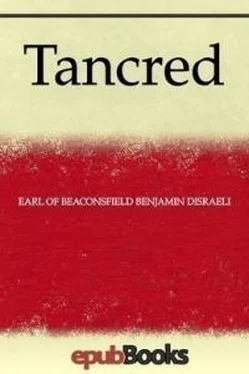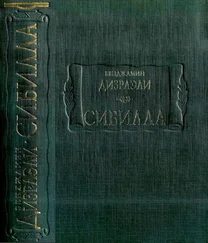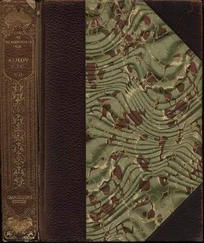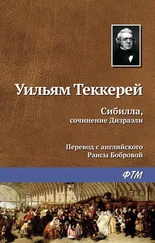Бенджамин Дизраэли - Tancred
Здесь есть возможность читать онлайн «Бенджамин Дизраэли - Tancred» весь текст электронной книги совершенно бесплатно (целиком полную версию без сокращений). В некоторых случаях можно слушать аудио, скачать через торрент в формате fb2 и присутствует краткое содержание. Год выпуска: 2014, Издательство: epubBooks Classics, Жанр: Классическая проза, на английском языке. Описание произведения, (предисловие) а так же отзывы посетителей доступны на портале библиотеки ЛибКат.
- Название:Tancred
- Автор:
- Издательство:epubBooks Classics
- Жанр:
- Год:2014
- ISBN:нет данных
- Рейтинг книги:4 / 5. Голосов: 1
-
Избранное:Добавить в избранное
- Отзывы:
-
Ваша оценка:
- 80
- 1
- 2
- 3
- 4
- 5
Tancred: краткое содержание, описание и аннотация
Предлагаем к чтению аннотацию, описание, краткое содержание или предисловие (зависит от того, что написал сам автор книги «Tancred»). Если вы не нашли необходимую информацию о книге — напишите в комментариях, мы постараемся отыскать её.
Tancred — читать онлайн бесплатно полную книгу (весь текст) целиком
Ниже представлен текст книги, разбитый по страницам. Система сохранения места последней прочитанной страницы, позволяет с удобством читать онлайн бесплатно книгу «Tancred», без необходимости каждый раз заново искать на чём Вы остановились. Поставьте закладку, и сможете в любой момент перейти на страницу, на которой закончили чтение.
Интервал:
Закладка:
'Princes,' said the Queen, 'you are welcome to Gindarics, where nobody ever comes. For we are people who wish neither to see nor to be seen. We are not like other people, nor do we envy other people. I wish not for the ships of the Queen of the English, and my subjects are content to live as their fathers lived before them. Our mountains are wild and barren; our vales require for their cultivation unceasing toil. We have no gold or silver, no jewels; neither have we silk. But we have some beautiful and consoling thoughts, and more than thoughts, which are shared by all of us and open to all of us, and which only we can value or comprehend. When Darkush, who dwells at Damascus, and was the servant of my father, sent to us the ever–faithful messenger, and said that there were princes who wished to confer with us, he knew well it was vain to send here men who would talk of the English and the Egyptians, of the Porte and of the nations of Fran–guestan. These things to us are like the rind of fruit. Neither do we care for cottons, nor for things which are sought for in the cities of the plains, and it may be, noble Emir, cherished also in the mountains of Lebanon. This is not Lebanon, but the mountains of the Ansarey, who are as they have ever been, before the name of Turk or English was known in Syria, and who will remain as they are, unless that happens which may never happen, but which is too beautiful not to believe may arrive. Therefore I speak to you with frankness, princes of strange countries: Dar–kush, the servant of my father, and also mine, told me, by the ever–faithful messenger, that it was not of these things, which are to us like water spilt on sand, that you wished to confer, but that there were things to be said which ought to be uttered. Therefore it is I sent back the faithful messenger, saying, "Send then these princes to Gindarics, since their talk is not of things which come and go, making a noise on the coast and in the cities of the plains, and then passing away." These we infinitely despise; but the words of truth uttered in the spirit of friendship will last, if they be grave, and on matters which authorise journeys made by princes to visit queens.'
Her Majesty ceased, and looked at Keferinis, who bowed profound approbation. Tancred and Fakre–deen, also exchanged glances, but the Emir waved his hand, signifying his wish that Tancred should reply, who, after a moment's hesitation, with an air of great deference, thus ventured to express himself:
'It seems to me and to my friend, the Prince of the Lebanon, that we have listened to the words of wisdom. They are in every respect just. We know not, ourselves, Darkush, but he was rightly informed when he apprised your Majesty that it was not upon ordinary topics, either political or commercial, that we desired to visit Gindarics. Nor was it out of such curiosity as animates travellers. For we are not travellers, but men who have a purpose which we wish to execute. The world, that, since its creation, has owned the spiritual supremacy of Asia, which is but natural, since Asia is the only portion of the world which the Creator of that world has deigned to visit, and in which he has ever conferred with man, is unhappily losing its faith in those ideas and convictions that hitherto have governed the human race. We think, therefore, the time has arrived when Asia should make one of its periodical and appointed efforts to reassert that supremacy. But though we are acting, as we believe, under a divine impulse, it is our duty to select the most fitting human agents to accomplish a celestial mission. We have thought, therefore, that it should devolve on Syria and Arabia, countries in which our God has even dwelt, and with which he has been from the earliest days in direct and regular communication, to undertake the solemn task. Two races of men, alike free, one inhabiting the desert, the other the mountains, untainted by any of the vices of the plains, and the virgin vigour of their intelligence not dwarfed by the conventional superstitions of towns and cities, one prepared at once to supply an unrivalled cavalry, the other an army ready equipped of intrepid foot–soldiers, appear to us to be indicated as the natural and united conquerors of the world. We wish to conquer that world, with angels at our head, in order that we may establish the happiness of man by a divine dominion, and crushing the political atheism that is now desolating existence, utterly extinguish the grovelling tyranny of self–government.'
The Queen of the Ansarey listened with deep and agitated attention to Tancred. When he had concluded, she said, after a moment's pause, 'I believe also in the necessity of the spiritual supremacy of our Asia. And since it has ceased, it seems not to me that man and man's life have been either as great or as beautiful as heretofore. What you have said assures me that it is well that you have come hither. But when you speak of Arabia, of what God is it you speak?'
'I speak of the only God, the Creator of all things, the God who spoke on the Arabian Mount Sinai, and expiated our sins upon the Syrian Mount Calvary.'
'There is also Mount Olympus,' said the Queen, 'which is in Anatolia. Once the gods dwelt there.'—'The gods of poets,' said Tancred. 'No; the gods of the people; who loved the people, and whom the people loved.'
There was a pause, broken by the Queen, who, looking at her minister, said, 'Noble Keferinis, the thoughts of these princes are divine, and in every respect becoming celestial things. Is it not well that the gates of the beautiful and the sacred should not be closed?'
'In every sense, irresistible Queen, it is well that the gates of the beautiful and the sacred should not be closed.'
'Then let them bring garlands. Princes,' the Queen continued, 'what the eye of no stranger has looked upon, you shall now behold. This also is Asian and divine.'
Immediately the chamber again filled. The Queen, looking at the two princes and bowing, rose from her seat. They instantly followed her example. One came forward, offering to the Queen, and then to each of them, a garland. Garlands were also taken by Keferinis and a few others. Cypros and her companions walked first, then Keferinis and one who had stood near the royal divan; the Queen, between her two guests, followed, and after her a small and ordered band.
They stopped before a lofty portal of bronze, evidently of ancient art.' This opened into a covered and excavated way, in some respects similar to that which had led them directly to the castle of Gin–darics; but, although obscure, not requiring artificial light, yet it was of no inconsiderable length. It emerged upon a platform cut out of the natural rock; on all sides were steep cliffs, above them the bright blue sky. The ravine appeared to be closed on every side.
The opposite cliff, at the distance of several hundred yards, reached by a winding path, presented, at first, the appearance of the front of an ancient temple; and Tancred, as he approached it, perceived that the hand of art had assisted the development of an imitation of nature: a pediment, a deep portico, supported by Ionic columns, and a flight of steps, were carved out of the cliff, and led into vast caverns, which art also had converted into lofty and magnificent chambers. When they had mounted the steps, the Queen and her companions lifted their garlands to the skies, and joined in a chorus, solemn and melodious, but which did not sound as the language of Syria. Passing through the portico, Tancred found himself apparently in a vast apartment, where he beheld a strange spectacle.
At the first glance it seemed that, ranged on blocks of the surrounding mountains, were a variety of sculptured figures of costly materials and exquisite beauty; forms of heroic majesty and ideal grace; and, themselves serene and unimpassioned, filling the minds of the beholders with awe and veneration. It was not until his eye was accustomed to the atmosphere, and his mind had in some degree recovered from the first strange surprise, that Tancred gradually recognised the fair and famous images over which his youth had so long and so early pondered. Stole over his spirit the countenance august, with the flowing beard and the lordly locks, sublime on his ivory throne, in one hand the ready thunderbolt, in the other the cypress sceptre; at his feet the watchful eagle with expanded wings: stole over the spirit of the gazing pilgrim, each shape of that refined and elegant hierarchy made for the worship of clear skies and sunny lands; goddess and god, genius and nymph, and faun, all that the wit and heart of man can devise and create, to represent his genius and his passion, all that the myriad developments of a beautiful nature can require for their personification. A beautiful and sometimes flickering light played over the sacred groups and figures, softening the ravages of time, and occasionally investing them with, as it were, a celestial movement.
Читать дальшеИнтервал:
Закладка:
Похожие книги на «Tancred»
Представляем Вашему вниманию похожие книги на «Tancred» списком для выбора. Мы отобрали схожую по названию и смыслу литературу в надежде предоставить читателям больше вариантов отыскать новые, интересные, ещё непрочитанные произведения.
Обсуждение, отзывы о книге «Tancred» и просто собственные мнения читателей. Оставьте ваши комментарии, напишите, что Вы думаете о произведении, его смысле или главных героях. Укажите что конкретно понравилось, а что нет, и почему Вы так считаете.







![Мелани Бенджамин - Госпожа отеля «Ритц» [litres]](/books/384861/melani-bendzhamin-gospozha-otelya-ritc-litres-thumb.webp)




